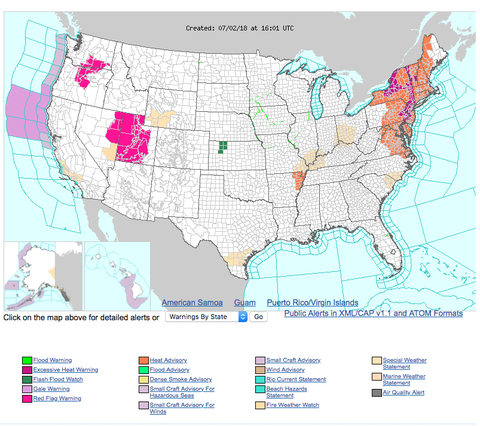
If you’ve been looking for an excuse to be a homebody, now is the time to crank up the air conditioning and catch up on Westworld.
The Central and Eastern regions of the United States are experiencing a brutal heat wave that’s expected to last through at least July 4, according to the National Weather Service. As the Weather Forecast Office of New York warns, everyone in an impacted region should be extra careful to avoid heat-related illnesses in the coming days. Over the weekend, New York City temperatures reached the high 90s and public health officials urged residents to stay indoors as a safety precaution.
“Hot and humid weather like what we’re experiencing this weekend can cause heat illness, and even death,” Health Commissioner Dr. Mary Bassett said in a statement on July 1. “If you have air conditioning and you have not used it up until now, now is the time to turn it on.”
National Weather Service
Generally, we’re able to regulate our internal temperature by sweating, but the excessive heat makes it harder for our body to cool itself, which could lead to one of three heat-related illnesses. Since these blazing temperatures aren’t going away just yet, here’s what you need about how to stay safe this Independence Day.
How to Spot and Treat Heat Cramps
The most mild heat-related problem, these painful muscle cramps usually set in during or after intense exercise in high temperatures. If you’ve decided to pull a Chris Hemsworth and work out despite the heat, watch out for pain and spasms (typically isolated in the legs), heavy sweating and flushed skin. The Centers for Disease Control and Prevention recommends stopping activity immediately following signs of a heat cramp and hydrating with water. Head to the doctor if you have heart problems or your pain persists for longer than an hour.
Heat Advisories begin to go into effect for much of the region on Saturday, with many locations (New York City, Nassau County, Northeast New Jersey, and the Lower Hudson Valley) having an Excessive Heat Watch for Sunday as Sunday is expected to be the hotter of the two days. pic.twitter.com/SWFGUpUCxn
How to Spot and Treat Heat Exhaustion
Heat exhaustion is more severe than cramps, and typically occurs when high temperatures are mixed with humidity and physical activity. As with heat cramps, you may experience heavy sweating, muscle pain, and spasms. But once your condition has escalated, you could also be fatigued, dizzy, nauseous, suffer from a headache, and have cool, clammy skin. To treat heat exhaustion, the CDC advises resting in a cool spot, hydrating with water, and taking a cold bath. If symptoms last longer than an hour or you begin vomiting, it’s time to get medical help.
Heading to the beach to stay cool today? Be sure to take plenty of water & an umbrella for shade! ☀️? pic.twitter.com/CNFDrLOfL8
How to Spot and Treat Heat Stroke
Heatstroke can be dangerous and cause brain, organ, and muscle damage, or even death, if you don’t seek treatment. This serious heat-related injury happens when your body is unable to keep itself cool and reaches 104 degrees Fahrenheit. At this point, you may be confused or delirious, experience slurred speech, or have a racing heart or shallow breathing. Anyone who shows signs of heat stroke should seek medical attention right away. The Mayo Clinic recommends taking a cold shower or cooling off with ice packs in an area safe from the sun while waiting for help.
Here are some graphics about heat. With temperatures at or above 95 in many areas tomorrow, you may want to check it out! Don’t leave babies and pets in cars: Look before you lock! pic.twitter.com/oGwmnmrU8D
How to Prevent Heat Stroke
Thankfully, heat stroke (or any of the warm-weather illnesses) can be prevented by exerting some caution:
Older adults and children are at greater risk of developing one of these conditions as their nervous systems are less able to deal with the changes in body temperature. Certain medications, like antidepressants, beta blockers, diuretics and blood pressure pills can also interfere with your ability to respond to heat.
Your best bet to ride out the heat wave is to stay home and enjoy the AC.
Source: Read Full Article
